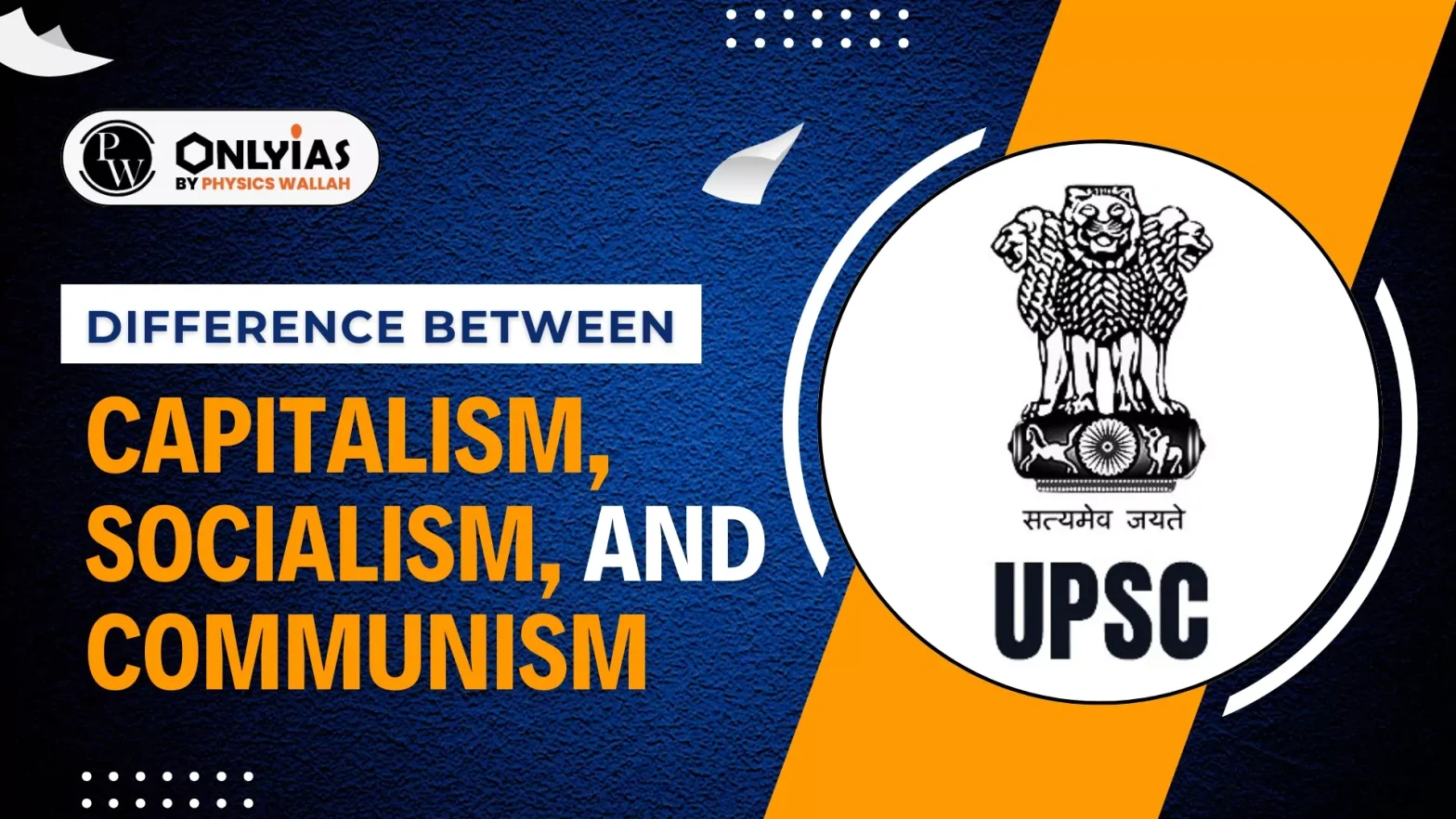Difference Between Capitalism, Socialism, and Communism is provided here. Understand the differences, their differences, and basics.

Capitalism, Socialism, and Communism are three distinct economic systems that influence how societies organize resources, wealth, and governance. Understanding these systems is crucial for UPSC aspirants as they shape the global economy and political landscapes. Each system has its unique approach to ownership, economic inequality, and the role of government in managing the economy.
The fundamental differences between Capitalism, Socialism, and Communism lie in ownership, control of resources, economic equality, and the role of government. These differences affect how societies function, distribute wealth, and promote individual or collective goals.
| Aspect | Capitalism | Socialism | Communism |
| Ownership of Resources | Private ownership of property and businesses | Public or collective ownership of resources | Complete state control over all resources |
| Economic System | Market economy (supply and demand-driven) | Planned economy (state intervention) | Command economy (centralized government control) |
| Wealth Distribution | Inequality accepted as part of the competition | Aims to reduce inequality through wealth redistribution | Focus on complete equality and communal ownership |
| Role of Government | Minimal intervention in business and economy | Significant government role in redistributing resources | Total government control over the economy |
| Political System Associated | Democracy | Democratic socialism or mixed systems | Authoritarian or totalitarian rule |
| Market Type | Free market economy | Often Mixed economy with state influence | Command economy with no free market |
| Religion | Indifferent to religion, but wealthier religious groups. | Allows freedom of religion | Religion is abolished |
Capitalism is an economic system where private individuals or businesses own and control resources, production, and trade. The primary driver is the profit motive, and prices are determined by supply and demand in the market economy. Government intervention is minimal, and competition encourages innovation and growth. However, capitalism also tends to result in economic inequality, as wealth accumulates in the hands of those who own the means of production.
Key Features of Capitalism:
Socialism advocates for public or collective ownership of resources and industries, to reduce economic inequality. The government plays a key role in managing the economy, redistributing wealth, and providing essential services like healthcare and education. In socialism, a planned economy is often used, where the state directs resources and production to meet societal needs rather than private profit.
Key Features of Socialism:
Communism is an extreme form of socialism in which the state has total control over the economy. It aims for a classless society with complete equality. In communism, private property is abolished, and the community owns all resources and means of production. The government directs all economic activities through a command economy, where collective goals replace individual incentives. Karl Marx’s ideology forms the basis of modern communism.
Key Features of Communism:
A market economy (as seen in capitalism) operates on supply and demand, where private businesses make decisions on production and pricing. In contrast, a planned economy (in socialism and communism) involves control over production, pricing, and distribution, aiming to meet social and economic goals rather than profit.
| Aspect | Market Economy | Planned Economy |
| Decision-Makers | Private businesses and consumers | Government or central authority |
| Pricing | Determined by supply and demand | Set by the government |
| Innovation | Driven by competition | Controlled and regulated by the state |
| Focus | Profit and growth | Social welfare and equality |
In capitalism, private property and businesses are the economy’s foundation, giving individuals the freedom to own and control assets. In socialism and communism, public or state ownership of resources ensures wealth is distributed more equally.
| Aspect | Private Property | Public Ownership |
| Control | Individuals and businesses | State or community control |
| Wealth Distribution | Can lead to significant inequality | Aims to reduce wealth gaps |
| Incentive | Profit-driven | Collective welfare and social equality |
Economic inequality is a byproduct of competition in capitalism, where those who own resources accumulate wealth. In contrast, socialism and communism aim to eliminate inequality by redistributing wealth and resources to ensure all individuals have equal opportunities.
| Aspect | Economic Inequality | Economic Equality |
| Associated with | Capitalism | Socialism and Communism |
| Focus | Wealth accumulation by individuals | Equal distribution of resources |
| Outcome | Competition leads to winners and losers | Equal access to resources and wealth for all |
Ready to boost your UPSC 2025 preparation? Join PW’s UPSC online courses today!
UPSC Exam 2025 Related Articles
UPSC Prelims 2025 Exam
UPSC Notification 2025
UPSC Preparation 2025
UPSC Eligibility 2025
UPSC Exam Pattern
UPSC Syllabus
Capitalism emphasizes private ownership and free markets, while socialism advocates for public ownership and wealth redistribution to reduce inequality.
No, communism is a more extreme form of socialism where the state controls all aspects of the economy, aiming for complete equality and classlessness.
Capitalism is often linked with democracy, socialism with democratic socialism or mixed systems, and communism with authoritarian regimes.
A market economy operates on supply and demand with minimal government intervention, while a planned economy is directed by the government, focusing on societal needs.
Yes, many countries adopt a mixed economy, combining elements of capitalism (private ownership) and socialism (government regulation) to balance growth with social welfare.

<div class="new-fform">
</div>